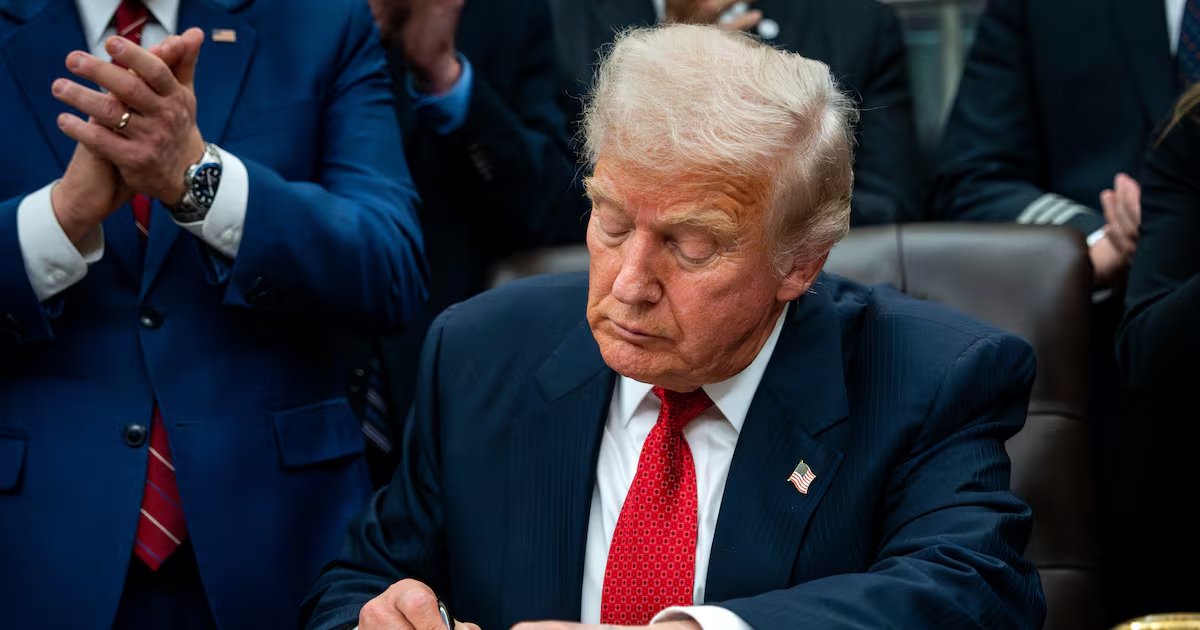Trump signs funding Bill to end longest US government shutdown

The longest US government shutdown in history ended on Wednesday after more than 42 days, following the House of Representative’s passage of a Bill negotiated by Republicans and a splinter group of Democrat-aligned senators.
The compromise sets the stage for government operations to return to normal through January, while leaving unresolved the issue of expiring tax credits for Affordable Care Act, or Obamacare health plans, which most Democrats demanded be extended in any deal to reopen the government.
After it was unveiled over the weekend, the Senate approved the compromise on Monday, and the House followed suit two days later by a margin of 222 in favour and 209 against, with two not voting. Donald Trump signed the Bill on Wednesday night, saying “we’re sending a clear message that we will never give in to extortion, because that’s what it was … the Democrats tried to extort our country.”
Six Democrats broke with their party to vote for the Bill: Adam Gray of California, Tom Suozzi of New York, Marie Gluesenkamp Perez of Washington, Don Davis of North Carolina, Henry Cuellar of Texas and Jared Golden of Maine. Two Republicans, Thomas Massie of Kentucky and Greg Steube of Florida, voted against it.
“The Democrat shutdown is finally over thanks to House and Senate Republicans,” House Republican leadership said in a statement.
“There is absolutely no question now that Democrats are responsible for millions of American families going hungry, millions of travellers left stranded in airports, and our troops left wondering if they would receive their next paycheck.”
In remarks on the House floor shortly before the vote, Democratic minority leader Hakeem Jeffries had pledged to continue to press for the subsidies’ extensions.
“This fight is not over. We’re just getting started,” he said. “Either Republicans finally decide to extend the Affordable Care Act tax credits this year, or the American people will throw Republicans out of their jobs next year and end the speakership of Donald J Trump once and for all. That’s how this fight ends.”
The spending standoff was the biggest battle between congressional Democrats and Republicans since Mr Trump returned to the White House earlier this year. It resulted in unprecedented disruptions to government services, with the Trump administration ordering cuts to commercial air travel across the country, and the first-ever halt to the largest federal food aid programme.
Reeling from their election defeats last year, Democrats had seized on an end-of-September expiration of government funding to make a stand on healthcare, a signature issue of the party over the past decade and a half. The Obamacare tax credits were created during Joe Biden’s presidency, and lowered premiums for enrollers of plans bought under the law.
Democrats wanted them extended as part of any deal to continue government funding. The party made other demands as well, including curbs on Mr Trump’s use of rescissions to slash money Congress had previously authorised and an undoing of cuts to Medicaid which Republicans had approved earlier in the year. But as the battle went on, it became clear that an extension of the subsidies was the main objective.
Republicans, who control both the House and the Senate, counter-offered with a Bill to fund the government through the third week of November, without any spending cuts or major changes to policy. They passed the measure through the lower chamber with only a single Democrat in support, but the minority used the Senate’s filibuster to block its passage there.
The shutdown began on October 1st, resulting in around 700,000 federal workers being furloughed. Hundreds of thousands of others, from active-duty military to law enforcement to airport security screeners, remained on the job without pay.
Russell Vought, the White House office of management and budget director known for his hostility towards the federal workforce, seized on the funding lapse to order further lay-offs of government employees. He also cut funding for infrastructure projects in states that voted for Kamala Harris last year.
Though Mr Trump ordered military members be paid in a move that many experts called likely illegal, other federal workers missed paychecks. Food banks began reporting increased demand as the shutdown went on, with the need worsening after the White House halted payments under the Supplemental Nutrition Assistance Program, or food stamps, citing the government funding lapse.
US minority leader Hakeem Jeffries speaks alongside Democratic members of the House of Representatives about health care and the vote to end the government shutdown during a press conference outside the US Capitol in Washington, DC. Photograph: SAUL LOEB/AFP via Getty Images
Last week, Sean Duffy, the transportation secretary, ordered a cutback in flights at US airports, saying air traffic controllers were facing unprecedented strain after weeks of unpaid work. Widespread flight cancellations were reported in the days that followed.
In the Senate, most Democrats remained onboard with the party’s strategy for weeks. Senate majority leader John Thune held 14 votes on the GOP funding measure, but only three members of the minority caucus ever broke ranks to support it.
In early November, Democrats swept off-year elections, winning gubernatorial elections in Virginia and New Jersey by significant margins, as well as voter approval for new congressional maps in California that will help the party’s candidates.
Democratic leaders said the wins vindicated their strategy in the funding fight, a statement Mr Trump echoed, saying “the shutdown is a big factor” in the GOP’s poor performance. He began pressing Republican senators to scrap the filibuster, which would have negated the 60-vote threshold spending legislation needs to clear in the chamber, where the GOP holds 53 seats.
Meanwhile, a small group of moderate members of the Senate Democratic caucus had been negotiating a compromise to end the shutdown. It ended up funding the government through January and undoing the lay-offs the Trump administration had ordered after the shutdown began.
But it included no additional funding for the Affordable Care Act tax credits – instead, Mr Thune agreed to allow a vote on the issue by mid-December. There’s no telling if it will win the GOP support needed to pass, and Mike Johnson, the Republican House speaker, has not said he will put any legislation up for a vote.
Despite howls of outrage from both House and Senate Democrats, the Senate passed it with 60 votes on Monday: eight from lawmakers in the Democratic caucus, and the rest from Republicans.
Yet the fight over the ACA subsidies is unlikely to be over. Enrollers in the plans received notices of premium increases in November because of the tax credits’ expiration. One study predicted they would rise by an average of 26 per cent, potentially bringing them to levels unaffordable to many.
With government funding expiring again at the end of January, Democrats could use the opportunity to again demand the subsidies be extended. − Guardian



